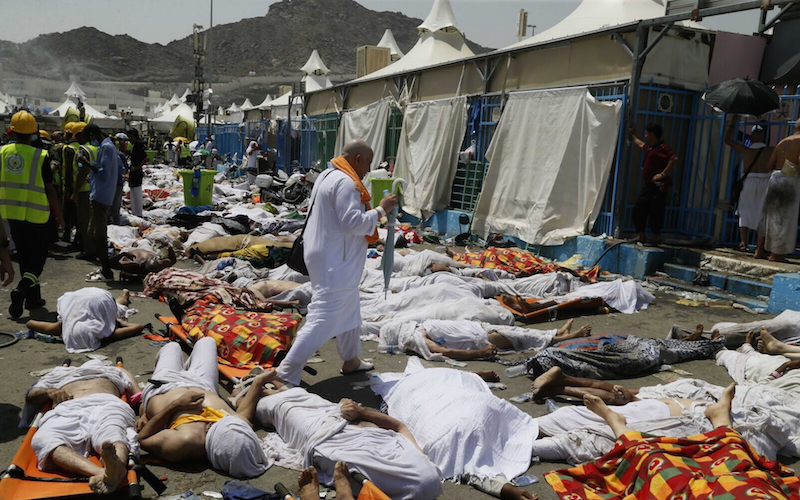
The Hajj Stampede Exacerbates Saudi-Iranian Tension
Saudi Arabia’s legitimacy in the Muslim world is largely rooted in the kingdom’s role as the “Custodian of the Two Holy Mosques” in Mecca and Medina — the two holiest sites in Islam. The task of ensuring the safety of the millions of Muslim pilgrims who make their holy voyage to Mecca poses a major logistical and security challenge for Riyadh. Throughout recent history, deadly stampedes, fires, clashes with security forces and one bombing have killed thousands of Hajjis. Since the 2006 disaster, the Saudis have invested billions of dollars into new infrastructure, technology (such as CCTV cameras, RFID tracking technology and biometric cards) and enhanced security to minimize the risk of such catastrophes.
Last month’s tragic crane collapse in Mecca and stampede in Mina certainly damaged Saudi Arabia’s prestige and have raised further question about Riyadh’s capacity to effectively administer the Hajj.
The two accidents occurred as the kingdom faces a host of other crises, ranging from the costly war in Yemen and budgetary strains fueled by low oil prices, to rising sectarian unrest in the Eastern Province and militant Sunni fundamentalism inspired by Daesh.
The incidents in Mecca and Mina call into question how much longer Al Saud can successfully juggle these increasingly serious foreign and domestic challenges.
Riyadh’s allies, such as Algeria, Egypt and Pakistan, avoided directly criticizing the Saudi government despite losing scores of their citizens in the stampede. However, the leaders of Saudi Arabia’s arch rival, Iran — which lost 464 citizens in the stampede (more than any other nation) — saw no reason to respond with a mild tone. Iran’s Supreme Leader attributed the tragedy to Saudi “mismanagement” of the Hajj. Ayatollah Ali Khamenei demanded that Saudi officials “accept their responsibility in this grave incident by apologizing to the Muslim Ummah and bereft families.” Iranian President Hassan Rouhani called for an independent investigation into the catastrophe while threatening force if Riyadh fails to cooperate.
In addition to the reported loss of more than 1,400 lives during the stampede, the political firestorm that has resulted is exacerbating an already very tense relationship. The heightened tension between Riyadh and Tehran as a result of the Hajj deaths makes it even less likely that the two powers can find common ground to pursue diplomatic efforts aimed at reaching negotiated settlements to the ongoing conflicts in Syria, Iraq and Yemen, where Saudi Arabia and Iran’s conflicting geopolitical agendas have fueled political violence and served to deepen the region’s sectarian divisions. The Iranian deaths have complicated Tehran’s plans to explore opportunities to ease tension and pursue improved relations with Saudi Arabia and other Gulf Arab states, which is a high priority for President Rouhani.
In the kingdom there is a widespread perception that Tehran is exploiting the tragedy for its own political agenda. On October 4, Abdulrahman al-Rashed, the former General Manager of Al Arabiya News Channel, wrote in Asharq al-Awsat that “Iran’s aim of politicizing this case is to incite Iranians against the kingdom and justify its government’s foreign escapades.” Indeed, Saudi rulers have not forgotten the Hajj of 1987 when Iranians holding an anti-America protest clashed with Saudi security forces, resulting in the death of more than 400 Iranians. From Riyadh’s perspective, Iran uses the Hajj as a means of spreading its influence among Muslims, while stirring up trouble in the kingdom.
As Tehran’s proxies and allies continue to flex their muscles in countries bordering Saudi Arabia, and while Russia and Iran deepen their military involvement in Syria, the Saudis are growing increasingly troubled by the expansion of Iranian influence in the Arab world. The unsettling images of hundreds of dead pilgrims in Mina have only led to more finger-pointing between Riyadh and Tehran. Just as the death of hundreds of thousands of Syrians, Iraqis and Yemenis has failed to serve as an incentive to bring Saudi Arabia and Iran together to find peaceful solutions to some of the worst modern wars ever fought in the Middle East, last month’s Hajj tragedy has merely added fuel to the fire.
As seemingly endless killing continues across the region with Riyadh and Tehran providing their respective proxies with military, economic and political support, the biggest beneficiaries appear to be extremist forces such as al-Qaeda and Daesh, which thrive from chaos and sectarian hatred. Ideally, the Saudi and Iranian leaders will change course and use the Hajj tragedy as an opportunity to begin a new chapter in bilateral relations, yet at this juncture that appears unlikely.


